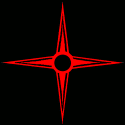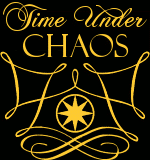The Galaxy was a spiral-formation accretion of stars that had been cruising through the universe with its local group for an exasecond or so. It was about a zettameter in radius, contained about 400 billion stars, and was just staggeringly immense. Or...one could brush by it in seconds on a Shadow walk. Metaphysics.

The Trader Empire (one might call it such, since the Tradespeak "herith" has no equivalent in Thari--"sphere of influence," perhaps, but that scarcely falls trippingly from the tongue) extended some 700 petameters in radius, taking Old Earth to be as good a center as any, encompassing some 1000 inhabited star systems, and tens of thousands more with nothing interesting in them. It was still mostly empty space and interstellar hydrogen, of course.
Off spinward to Earth and a bit to the galactic south was Calyst--a retirement home. It was a world with no axial tilt to speak of, orbiting a well-behaved G-type star. When the Trader Fleetyards moved from Jakom's Star to nearby Denova, Calyst underwent a renaissance, and was flourishing. A comfortable 300 or so Msec of travel away from one of the busiest systems in space, Calyst was close enough to the action that Trader retirees still felt connected, and far enough out of the way of the main routes that the Fleet wouldn't swing by and attempt to reactivate someone's commission unless it was really important. And it had thousands of kilometers of beautiful beaches.
On the northern continent, which had been compared by the imaginative to a leaping fish (an extremely fat, lopsided fish that has had a bite taken out of it right above the tail by a larger, hungrier fish) was a city snuggled between the fish's body and pectoral fin, and named Great Cascade after the waterfall which was, in fact, almost 100 kilometers inland from the city which bore its name. Great Cascade was built on the site of a city from Calyst's first civilization, whose name was lost in its collapse. The new city was a fine example of a metropolis, sprawling gleamingly and insolently over the Cascade River delta as though daring nature to do something about it. Nature did not deign to respond, likely because of the weather control satellites, and the Great Cascadians went merrily about their business, which seemed to involve a great deal of boating, hiking, revelry, and lazing about in the sun to recover from the boating, hiking, and revelry.
Ship life was different. Most crew rotated between suspended animation and 70 to 80 Msec duty shifts. Space aboard a ship underway was tight, though the designers tried to make it as comfortable as possible. Long-haul ships were an in-between place, to hone one's skills, to learn from the past or plan for the future. Crucial though they were to humanity, they were very much coffins, flying between the stars with a cargo of humans so cold and still they may as well have been dead, with only a few warm bodies at the helm and engines.
It was the ships that carried people--Traders, usually--from their safe homeworlds, out through the black, and to strange new worlds. Humans were always on the move, spreading out through the galaxy, building civilizations that rose and fell and spawned daughter civilizations that themselves reached out to new worlds...
The one constant was the Traders, and to call even them a "constant" is deceptive. Over the millennia they grew and changed as much as any of their client civilizations did, save for their one fixed ideal: Trade. So much did they value commerce--of goods, of ideas--that they named themselves after the principle itself. No matter where one went in human space, one found Traders, perhaps so changed from the main stock of their people that they were unrecognizable to anyone but the geneticists, but who would still smile, and still deal.

